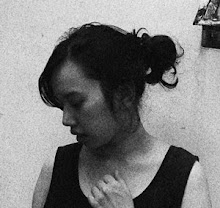Too late a post but probably just in time for the next Tropical Blaze Festival happening this February 27 and 28. Wrote this a few months back but didn't get the chance to post//
Earth. Water. Wind.
Fire.
These are the elements that are essential in ceramics.
Making pottery doesn’t stop after the shape is molded by the hands. It has to
be fired at a high temperature in order to hold its form. Without the intense
heat, clay remains impermanent and is bound to break again into mud. The Tropical
Blaze Wood-firing Festival is a celebration of this gift of fire. It is a series of events initiated by the
College of Fine Arts of the University of the Philippines, in partnership with
local potter Pablo Capatti III, which focuses on understanding the different traditional
and alternative methods of firing.
October 20, 2014. Diliman, Quezon City.
Clay pieces in the shape of unusual seeds were buried in sawdust, colorants, straw and shredded newspaper inside a pit. Firewood, kindling, newspapers and straw were placed next and was set ablaze like a huge campfire. The hearth was carefully tended for a while and was left to burn the combustible materials.
By afternoon, the firing of LUAL started. LUAL is a sculptural kiln in
the form of a birthing woman built by
Prof. Gudiño. The second firing started with a ritual. Wood, flowers,
salt, rice, and wine
were given as offertory along with prayers and songs.

Lual. Works from Ma'am Rita and Sir To Austria's class were fired inside the kiln.

Local potters, teachers, and students participated in firing Lual, which lasted until before dawn of the following day. Films, music, and good food kept us company as we waited for the ceramic pieces to come out of the birthing mother.
October 24-25, 2014. Capati Farm, San Jose, Brgy. Pinagtungulan, Batangas.
Students from the Ceramic Classes in UP arrived at Pablo Capati’s farm at around two in the afternoon. By the time we got settled, we were introduced to Pablo’s other guests. There were local potters and potters from Thailand.
Familiar faces: Kuya Benjie and Sir Pete beside the Anagama

Bathma Kaew-Ngok, a Thai potter who apprenticed in Japan, gave a demo on glazing tumblers in Igayaki using wood ash
We were all given the opportunity to glaze one piece. Hurray!
Mick and Sir Nick placing the glazed works inside the gas kiln

Sir Nick and Sir Joey loading the kiln
Afterwards, Bathma and the other Thai potters gave a demo on the wheel
We were also taught the proper way to stoke the Anagama. The Anagama Kiln is a type of Japanese
tunnel kiln. It is fired for two to three consecutive days to produce natural wood ash that settles on the works and
became its glaze!
Stoking with Kuya Benjie
By nighttime, we headed to the guesthouse for dinner and for the artists’ presentation. Seeing the works of other potters made me realize the different possibilities that can be achieved with clay, that it is not limited to the creation of functional ware. The night was capped with the designation of firing schedules, where each student was assigned to attend to the kiln for two hours. Spent the night talking to other potters about their passion with clay, and to just watched the allure of red fire
burning the wood.
Some of the students camped out during the night.
By morning, while most were still sleeping, we tried our hands on the wheel
Sir Pete doing a demo
By late, the others started coming in and made their own works as well. This lasted throughout the day with all of us in the zone, each creating unique pieces from flowers to corals and organic shapes. Btw, this is Koh, one of the Thai potters doing a handbuilding demo
With Ciara, my MFA classmate. Hi!
Ma'am Rita doing a sculptural piece and Sir To kneading clay
Mick doing a demo on how to make a drip coffee cup
Our works being dried
My work
The Anagama Kiln! Fire up the chimney
The fired pieces from last night's firing survived!
The day ended with Pablo giving out tumblers from the pieces we glazed the other day, and it was a surprise for us that the pieces from Bathma and Sir Joey were also handed out in a draw! Everyone went home happy and filled with gratitude for the invaluable experience and lessons that had been shared to us. Truly, fire has the capacity to transform not only clay, but people as well.
Special thanks for the demonstrations, workshops and talks from the local potters, Pablo Capati III, Joey de Castro, Pete Cortes, Benjie Ranada, Yohan; to the Thai potters, Bathma Kaew-Ngok, Prof. Sekporn “Nick” Tansripraparsiri, Natthapol “Mick” Wannaporn, Watchara “Koh” Siresevakul and to the UPCFA Ceramic Department, Prof. Rita Gudino.
Til the next Tropical Blaze!




























